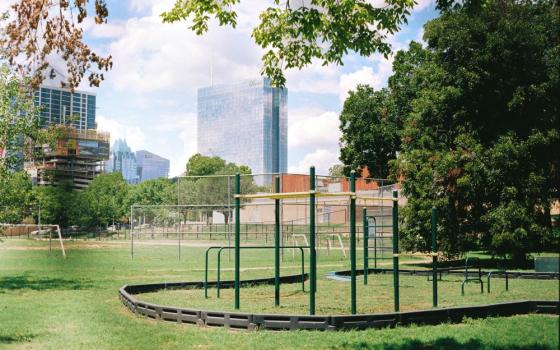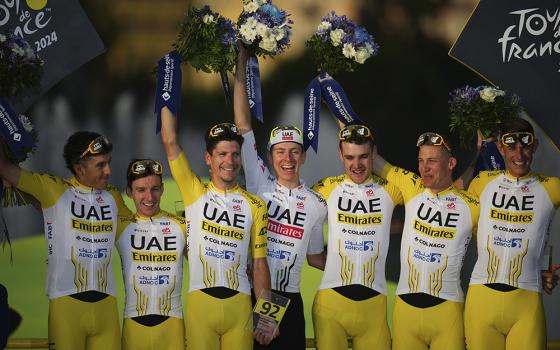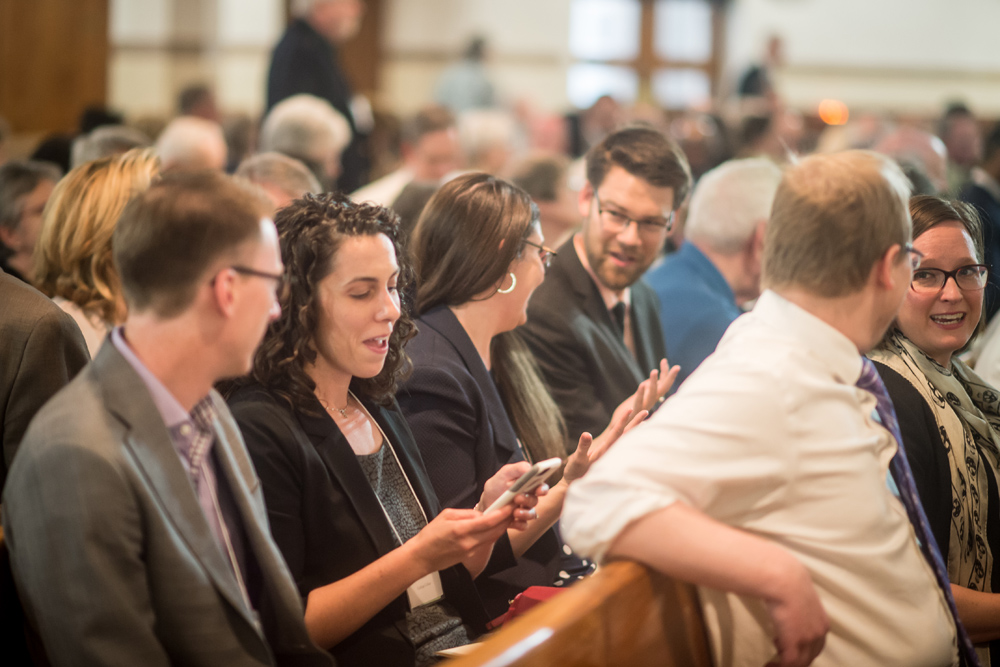
Younger members of the Catholic Theological Society of America chat before the start of Saturday evening's Mass, June 8 in Pittsburgh, during CTSA's annual convention June 6-9. (Paul J. Schutz/Santa Clara University)
It's rare that a paper at an academic conference is received like a hit song at a rock concert. But such was the case at the Friday morning plenary session at the Catholic Theological Society of America's annual convention, held June 6-9 in Pittsburgh.
In a paper titled "Another Pro-Life Movement is Possible: Untangling Patriarchy and the Pro-Life Movement," accompanied by a 40-slide PowerPoint presentation, theologian Emily Reimer-Barry argued that the pro-life movement the millennial generation has inherited is "deeply flawed, and Catholics need to rethink our support for it." Reimer-Barry is an associate professor from the University of San Diego.
In a ballroom of 400 scholars in their best business attire, Reimer-Barry sported a Black Lives Matter T-shirt and called on her colleagues to "untangle patriarchy from the pro-life movement" and to "resist patriarchy and the related mindsets of double standard morality, oversimplification and single-issue politics."
"I will not challenge the magisterial teaching that there should always be a presumption against taking human life," she said. But she also insisted, "We need to practice what we preach in an expanded pro-life movement."
Reimer-Barry sketched for the audience a "Catholic Plan of Action for Reproductive Justice" that would have as its priorities "listening to women, changing our political strategy, providing robust structural supports for women and children, and attending to a wider range of 'life' issues."
She also argued that Catholics who focus on abortion obscure the complexity of the concerns at stake. "Life in the womb does not have any greater claim on us than lives threatened by the structural violence of war, food insecurity, homelessness, police brutality, gang violence, substance abuse, poverty, child neglect and abuse, and migration."
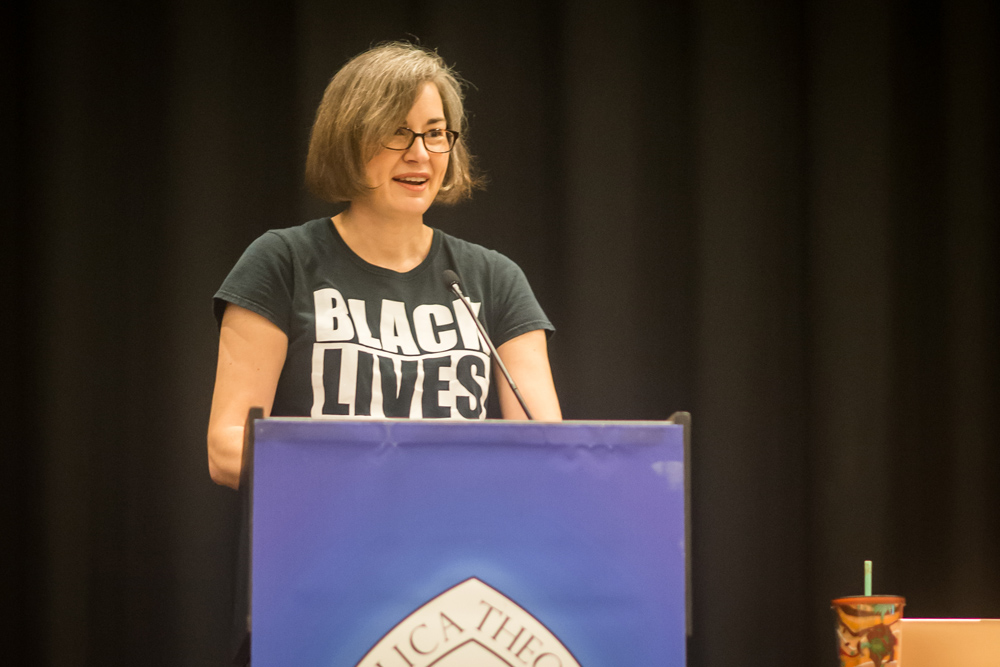
Emily Reimer-Barry offers the Friday morning plenary address at the CTSA convention June 7 in Pittsburgh. (Paul J. Schutz/Santa Clara University)
The presentation, and the similarly powerful response by theologian Nichole Flores, a professor at the University of Virginia, created a buzz the entire weekend, and I heard more than one theologian say the impassioned standing ovation that followed the session came out of a deep sense of relief that a critique of the pro-life movement was finally spoken aloud at a CTSA plenary.
"Emily gave a really brave, bold, and thought-provoking plenary," said Natalia Imperatori-Lee, associate professor of religious studies at Manhattan College, in an interview. "She brought such a trove of evidence that exposed how the myopic focus of Catholic moral teaching in the U.S. church on the criminalization of abortion has led the church to ally itself fully with patriarchy and with misogyny as it operates in U.S. politics today."
"She tackled a third-rail issue that is too often oversimplified, and polarizing, and therefore viewed as not worth engaging by many theologians," she added.
The paper was perfectly suited to this year's CTSA theme, "Another World is Possible: Violence, Resistance and Transformation." The topic seemed particularly urgent in Pittsburgh, where, just 10 months earlier, the clergy sexual abuse crisis had re-inflicted its agonies on U.S. Catholics after the publication of the Pennsylvania grand jury report that, in 1,400 grim and disturbing pages, detailed the sexual abuse of an estimated 1,000 minors by more than 300 priests.
Pittsburgh Bishop David Zubik, who was accused in the report of covering up for predator priests and who became the face of the official hierarchical response to the Pennsylvania crisis, welcomed CTSA participants during the opening evening of the conference, offering a litany of reasons he is grateful for the work of theologians
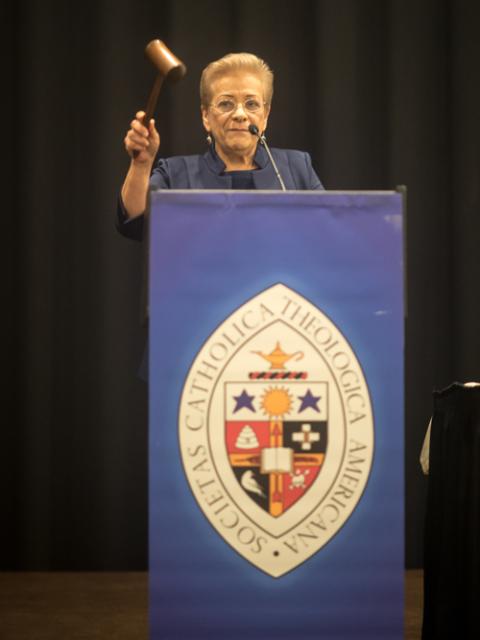
Maria Pilar Aquino was appointed the new president of CTSA for 2019-2020. (Paul J. Schutz/Santa Clara University)
Zubik may be glad for their work, but how other bishops feel about the Catholic Theological Society of America remains uncertain these days. Paul Lakeland, president (now past-president) of the society, said that there has been little communication with the U.S. bishops' conference, whose doctrinal committee is supposed to meet every two years with all U.S.-based theological guilds.
"It's very important to CTSA that we maintain dialogue with the bishops," Lakeland said in an interview, "so naturally we're disappointed that the conferences that have been going on biennially did not happen this year."
Lakeland has made the sexual abuse crisis a priority in his presidential year, facilitating the establishment of the CTSA Commission on Clerical Sexual Abuse of Minors, comprising a group of seven theologians, canon lawyers and ethicists.
"We charged them to aid the CTSA board in thinking about concrete steps we could take that are appropriate to a learned society of theologians," Lakeland said.
"We want to make a concerted effort to get at the roots of sexual abuse," he added, "which are very likely more theological than ecclesiological and psychological."
The commission presented some of its findings in a special session on the Friday evening of the conference, which featured an open mic inviting members to share their own reflections on the crisis and their responses to the work of the commission.
At the session, which ran until nearly 10 p.m., a number of theologians claimed that their repeated appeals to help their local bishops with the crisis were met with deafening silence.
"The United States Conference of Catholic Bishops has no authority," one exasperated scholar from Pittsburgh said.
But while bishops continue to distance themselves from the academy, CTSA members carried on, delivering over 130 papers at the meeting, with the themes of clericalism, patriarchy, and priestly formation looming large at many of the sessions.
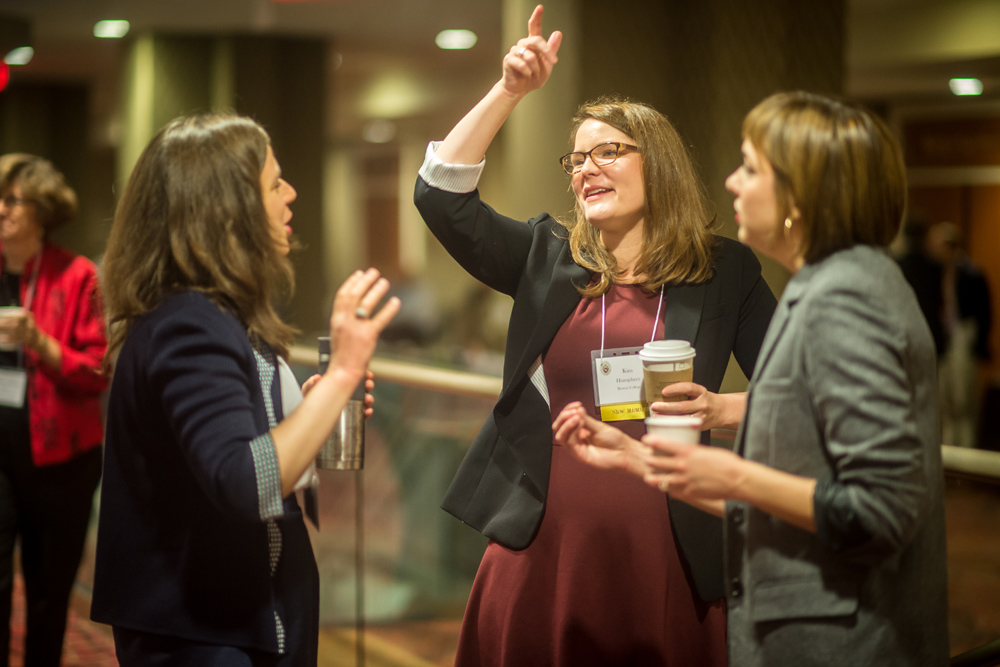
Theologians Julie Feder, Kim Humphrey and Megan McCabe enjoy a coffee break at the CTSA convention. (Paul J. Schutz/Santa Clara University)
One of the most exhaustive treatments of those issues came in ethicist Lisa Sowle Cahill's presentation, "Sexual Violence against Women and Children: How is a Another World Possible?"
Cahill, the J. Donald Monan professor at Boston College, set the scene by reminding her fellow scholars that clergy sex abuse occurs against a larger cultural backdrop "that encourages sexual violence in general, most often by men against women."
"This culture normalizes sex as an instrument of power, and encourages or even expects men to establish dominance through the use or threat of violence," Cahill said.
Cases of sexual abuse generally share two common features, Cahill argued. "The first is a culture of what social scientists call 'hegemonic masculinity,' more popularly known as 'toxic masculinity.' In religious institutions, male sexual dominance is mediated and reinforced by norms of gender conformity and sexual purity endowed with transcendent value."
The second characteristic is "a closed, hierarchical, male institution, which, in the religious case, grants unique prerogatives and authority to male religious leadership."
Both features, of course, are prominent in the all-male Catholic hierarchical structure.
But unlike other patriarchal institutions, the Catholic structure is further exacerbated by mandatory celibacy, she said, which brands and bonds the male elite.
Like many scholars and pundits, Cahill believes that change will come only from vigorous intervention from the laity. But she believes that what needs to be challenged and changed most is the "Catholic culture around sex and gender, whose supporting theology, the theology of the body, is idealistic, even romantic, but is simultaneously a vehicle for the norms of hegemonic masculinity."
"At the ground level it does little to challenge the connection between violence, power and sex in which women are disadvantaged, along with nonconforming men and all gender-queer people," Cahill added.
Instead, the laity must shift from a "culture of acceptance" to a "culture of noncompliance." This she says, will create the "movement mindset" necessary to enact specific demands and real change.
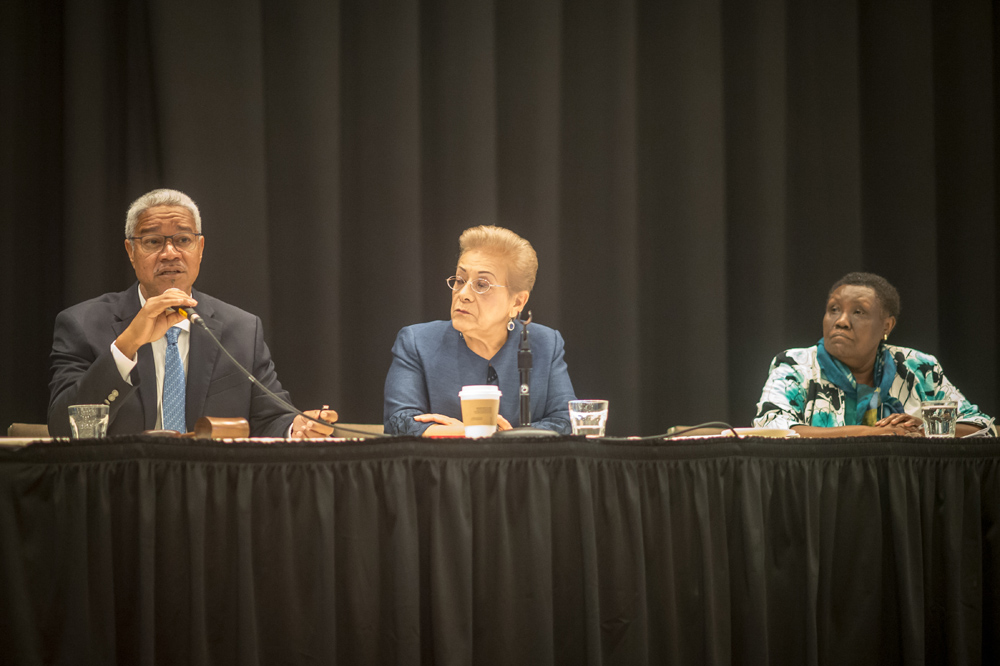
Gerald Boodoo, Maria Pilar Aquino and Teresia Hinga lead the Saturday morning plenary session. (Paul J. Schutz/Santa Clara University)
But is the patriarchy, which so many theologians claim to want to fight in the church, also still a corrosive force within the Catholic theological guild? Nearly two decades ago, when I was considering doing my Ph.D. in theology and ethics, I was told more than once that if I spoke out about women's ordination to the priesthood or came out as a lesbian, I would likely never get an academic position in a Catholic university. I wondered if young women theologians still are similarly cautioned about certain academic pursuits.
More than half a dozen young women scholars, all of whom asked not to be named, told me that, indeed, they are discouraged by their mentors from taking on issues of feminism, patriarchy in the church, and even the ordination of women in their work, for fear that they "won't be taken seriously."
Male scholars are praised when they do feminist theology, young women theologians told me, but when they themselves want to write something from a strong feminist stance, they are warned by professors and senior colleagues that they might be undermining their chances of getting jobs or tenure.
Perhaps this is the next "third-rail issue" that an intrepid CTSA member might take on in the future.
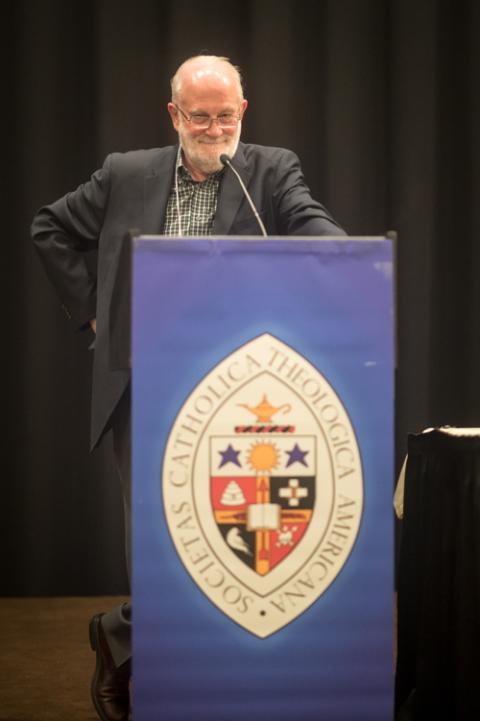
Paul Lakeland offers the presidential address at the final plenary session on Sunday morning. (Paul J. Schutz/Santa Clara University)
That said, as someone who attended her first CTSA convention in 2000 as a student worker, I was struck by how many participants were from the millennial generation and how racially and ethnically diverse the membership has become. Also remarkable was the visibility of openly LGBTQ theologians and ethicists, some of whom brought their partners to the meeting.
Lakeland partially credits this to the presidency of John Thiel, a Fairfield University professor, who served from 2011 to 2012, and whose restructuring of the CTSA convention opened up access for younger scholars to the process of proposing papers and convening sessions.
"The younger generation is bringing attitudes and knowledge into play that the older generations didn't understand, and we are all benefitting from it," said Lakeland.
In the Black Catholic Theology consultation on Saturday morning, which discussed "Black Survival in a Violent World: Passing on Our Stories," theologian Craig Ford Jr. of Fordham University, who received his doctorate in 2018, used his background in queer theory and queer black ethics to critique neoliberalism.
"What will it take for us to truly be free?" Ford asked as he charted the rise of neoliberalism as a response to social change movements, and exposed the way it compromises human flourishing and the common good.
Ford argued that we should look to some of the most disadvantaged among us to show us the way to dismantling the degrading structures of deregularization, privatization and laissez-fare capitalism.
This includes queer communities who, in their fighting for and living out their emancipation, offer an image of utopia, or a future not yet realized.
"We also need to believe black women," Ford said. "Black feminist leaders are keepers of our traditions for making justice," and they, too, are among the most marginalized among us, he said.
"Ask them about their vision for the pathway forward and put it into practice," Ford said. "We've never tried that before."
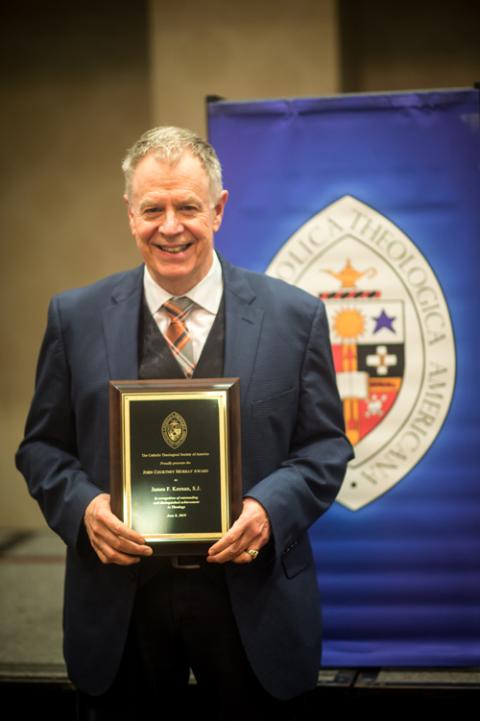
Jesuit Fr. James Keenan with the 2019 John Courtney Murray Award June 9 at the CTSA convention in Pittsburgh (Paul J. Schutz/Santa Clara University)
The subject of giving voice to the voiceless was perhaps most poignantly expressed on Saturday evening, when the John Courtney Murray Award was bestowed on Jesuit Fr. James Keenan for his decades of distinguished theological achievement. Keenan was honored particularly for founding the Catholic Theological Ethics in the World Church, or CTEWC, an international network of ethicists.
In his acceptance speech, Keenan recalled that as a child he struggled to express even his most basic needs or desires. His younger brother, Bobby, was the only person who could understand him and helped him find ways to make sense to others.
"Only now do I realize that by Bobby's helping me find my voice, I have always wanted to help others find theirs," said Keenan. "And I think that’s really most of what I do: whether mentoring or networking, I try to empower others to find their voice as I continue to find my own."
Keenan's award was one of three giving during the CTSA convention weekend. The Catherine Mowry LaCugna Award, for the best academic essay in the field of theology within the Roman Catholic tradition, was presented to Antonio Eduardo Alonso, and the Ann O'Hara Graff Memorial Award, given to a woman scholar from the society, was bestowed on Mary Rose D'Angelo.
On Sunday, the conference drew to its traditional mid-morning conclusion. Lakeland offered his presidential address, a very current critique of surveillance capitalism, which is the latest phase of neoliberal data mining of one's personal experience. Using liberation theology, Lakeland described how we might develop a spiritual resistance to what he sees as an especially sinister form of data mining.
And with that, the CTSA presidency was turned over the Maria Pilar Aquino, the first Latin American theologian of Mexican origin to serve as president of the society, who chose the theme of this year's conference.
Advertisement
Like many of the attendees I spoke to, Aquino says the meeting offered an infusion of hope and optimism in a church and a world that is suffering from a scarcity of both.
"The convention was a site of theological creativity within which a caring community of theologians strengthened a shared joy of doing theology for justice, peace, solidarity and interdependence," she said. "We are endeavoring to support the flourishing of our communities and environments both locally and globally."
Hope was also on the mind of Thiel, too, who was among the last attendees milling about the final coffee reception. He shrugged off any suggestion that his previous work as president allowed increased access for emerging and underrepresented scholars, and instead was struck by the spirit that seemed to inspire all attendees regardless of their age or status.
To Thiel's sadness, the institutional church is in in overwhelming disrepair and the U.S. bishops appear to feel that engaging with CTSA has more potential for loss than gain. But this year's conference was a clear sign that "theology is playing the long game," he said. "Hope is a marathon runner."
[Jamie L. Manson is an award-winning columnist at the National Catholic Reporter. Follow her on Twitter @jamielmanson.]
Editor's note: We can send you an email alert every time Jamie Manson's column, "Grace on the Margins," is posted to NCRonline.org. Sign up here.





